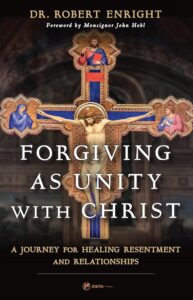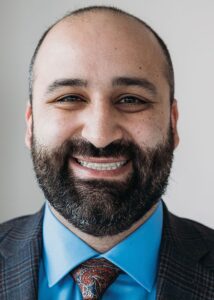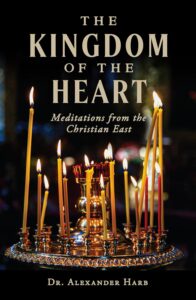Podcast: Play in new window | Download (Duration: 48:17 — 33.3MB) | Embed
Subscribe: Apple Podcasts | Spotify | Amazon Music | Android | Pandora | iHeartRadio | JioSaavn | Podchaser | Gaana | Podcast Index | Email | TuneIn | Deezer | Anghami | RSS | More

Dr. Robert D. Enright – Forgiving as Unity with Christ on Inside the Pages with Kris McGregor
Dr. Robert Enright speaks with Kris McGregor about his book Forgiving as Unity with Christ: A Journey for Healing, Resentment, and Relationships. He shares how an epiphany in 1985 redirected his academic career toward the study of forgiveness, which had previously been neglected in psychological research. Forgiveness, as a moral virtue, can transform the heart by healing the effects of injustice such as anger, resentment, and mistrust. Drawing from Aristotle and Aquinas, forgiveness does not excuse wrongdoing, demand forgetfulness, require reconciliation, or negate the pursuit of justice. Rather, it involves offering goodness to one who has acted unfairly, allowing a person to reclaim peace and dignity while also maintaining boundaries and seeking fairness where needed.
Dr. Enright outlines forgiveness as a deliberate, grace-filled path that must often be walked slowly, with self-awareness and even journaling. He discusses its spiritual dimensions, particularly its unity with Christ’s suffering and love on the cross, which brings healing not only to the individual but potentially to the offender and their relationship. He touches on the need for forgiveness education, especially within Catholic contexts, to help children and adults alike cope with life’s inevitable wounds. Dr. Enright also speaks on self-forgiveness, highlighting its importance in embracing one’s worth before God, especially through confession and sincere restitution. His research in diverse settings—from survivors of incest to prison inmates—demonstrates the transformative power of forgiveness on emotional, relational, and even physical well-being.
Discerning Hearts Reflection Questions:
- How does unhealed resentment affect your relationship with God and others?
- In what areas of your life might God be inviting you to forgive, even if the other person hasn’t repented?
- How can uniting your suffering with Christ on the cross transform your experience of injustice?
- Are there ways you’ve misunderstood forgiveness—as excusing, forgetting, or reconciling—that need to be corrected?
- How might your pursuit of justice be more Christ-like if it flows from a forgiving heart?
- Who in your life do you need to forgive not just for their sake, but for your own healing and freedom?
- How do you see the Sacrament of Reconciliation supporting both seeking and offering forgiveness?
- What role does prayer and grace play in your ability to forgive someone who deeply wounded you?
- How can cultivating forgiveness in your family or community reflect the mercy of Christ more fully?
- In what ways have you struggled with self-forgiveness, and how can God’s mercy reshape your self-understanding?
 From the book’s description:
From the book’s description:
Dr. Robert D. Enright, founder of the International Forgiveness Institute, invites you to travel with him down the road from alienation to forgiveness to possible reconciliation. His cathartic exercises will enliven your relationship with Jesus and provide a healing balm that will deepen your empathy and dispose you to forgiving others.
Similar to The Imitation of Christ, this work is divided into three books comprising short chapters with brief points to consider. The first book lays out forgiveness in general and includes biblical stories of forgiveness; the second approaches forgiveness from the Catholic perspective, including loving others through our intimate connection with Christ and seeking forgiveness ourselves; the third discusses skeptical views of forgiveness as well as self-forgiveness, forgiveness within communities, and what legacy you will leave behind.
These powerful exercises will help you understand what forgiveness actually is and why it is beneficial, including scientific studies of those who were suffering physically, psychologically, or emotionally and experienced healing.
You will learn answers to soul-searching questions and discover:
- How to embrace your littleness with the humility of a beloved child of God
- The Process Model of Forgiveness to aid you in becoming “forgivingly fit”
- Seven forgiveness lessons in the Old Testament story of Joseph and his brothers
- The three Rs that help complete the triangle of forgiveness and rebuild trust
- Seven aspects of “forgiveness as redemptive suffering”
- The importance of forgiveness in God’s design for our peace and joy
As you contemplate God’s love for you in these extraordinary pages, you will grow deeper in your faith through journaling prompts and transformative meditations, including penetrating questions to guide you on your path to freedom. The book has been given an imprimatur by Bishop Donald Hying of the Catholic Diocese of Madison, Wisconsin.
About the Author
Dr. Robert Enright is a member of the Catholic Church. He is a licensed psychologist and the founder of the International Forgiveness Institute, a nonprofit organization dedicated to disseminating knowledge about forgiveness and community renewal through forgiveness. In 2020, he was awarded the Aristotelian Professorship in Forgiveness Science in the Department of Educational Psychology at University of Wisconsin-Madison. He is the first to publish a scientific study on the topic of person-to-person forgiving (1989). He is a popular speaker on forgiveness, and his work has appeared in such outlets as Time magazine, the Los Angeles Times, and the Chicago Tribune and on ABC’s 20/20. His International Forgiveness Institute organized the Jerusalem Conference on Forgiveness for the Renewal of Individuals, Families, and Communities at the Notre Dame of Jerusalem Center, 2017; the Rome Conference on Forgiveness at the University of Santa Croce, 2018; and the International Educational Conference on Agape Love and Forgiveness in Madison, Wisconsin, 2022. For his innovative research on forgiveness, he received in 2022 what the American Psychological Association calls “psychology’s highest awards:” the APF Gold Medal Award for Impact in Psychology..


 An excerpt from “Crossing the Desert: Lent and Conversion”:
An excerpt from “Crossing the Desert: Lent and Conversion”:






 From the book’s description:
From the book’s description: